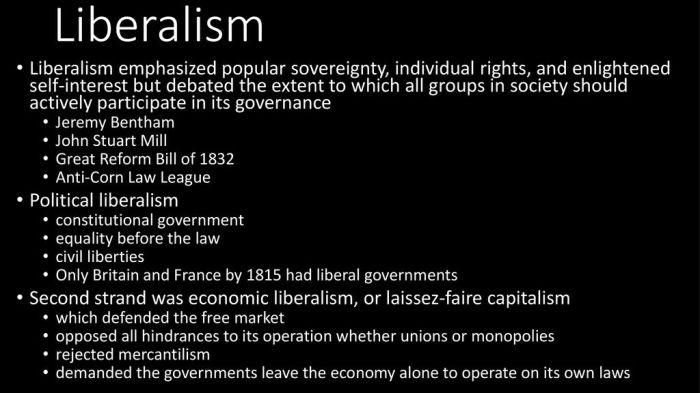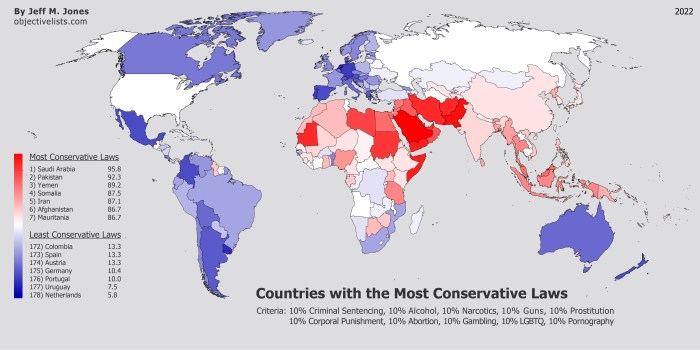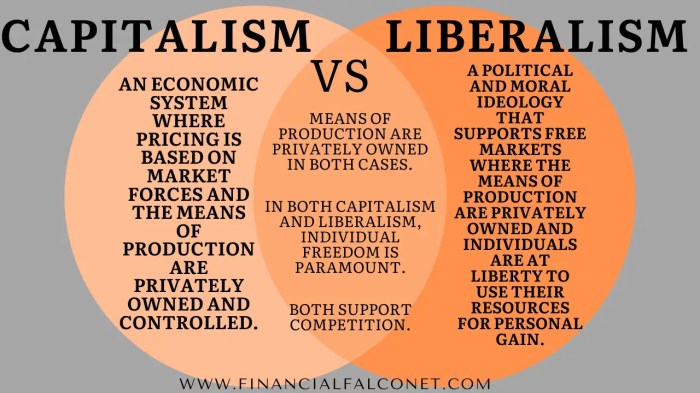How did the ideologies of liberalism and conservatism differ – At the heart of political discourse, the ideologies of liberalism and conservatism have shaped the course of history, their distinct principles and policies leaving an indelible mark on societies worldwide. This essay delves into the historical origins, core tenets, and contrasting perspectives of these two influential ideologies, exploring how they have influenced economic, social, and foreign policies.
Liberalism, with its emphasis on individual liberty, limited government, and free markets, stands in contrast to conservatism’s focus on tradition, order, and authority. These fundamental differences have played out in various policy areas, from economic interventionism to social welfare programs, shaping the political landscape of nations.
Historical Origins of Liberalism and Conservatism

Liberalism and conservatism emerged as distinct political ideologies during the Enlightenment period in the 18th century. Liberalism originated from the ideas of John Locke, who emphasized individual liberty, limited government, and the natural rights of man. Conservatism, on the other hand, was influenced by the writings of Edmund Burke, who stressed the importance of tradition, order, and established institutions.
Key Thinkers and Ideas
- Liberalism:John Locke (natural rights, limited government), Adam Smith (free markets), John Stuart Mill (individual liberty, utilitarianism)
- Conservatism:Edmund Burke (tradition, order), Joseph de Maistre (authority, religion), Friedrich Hayek (individualism, free markets)
Core Principles of Liberalism

Liberalism is founded on the belief in individual liberty, limited government, and free markets. Liberals believe that individuals should be free to pursue their own goals and make their own choices, with minimal interference from the state.
Individual Liberty, How did the ideologies of liberalism and conservatism differ
Liberals value individual liberty above all else. They believe that individuals should be free to express themselves, practice their religion, and make choices about their own lives, as long as they do not harm others.
Limited Government
Liberals believe that the role of government should be limited to protecting individual rights and ensuring a fair and just society. They advocate for a small government with limited powers.
Free Markets
Liberals believe that free markets are the best way to promote economic growth and prosperity. They support policies that encourage competition and innovation, such as free trade and deregulation.
Core Principles of Conservatism: How Did The Ideologies Of Liberalism And Conservatism Differ

Conservatism is characterized by a belief in tradition, order, and authority. Conservatives believe that society is best served by preserving established institutions and values.
Tradition
Conservatives value tradition and believe that it provides a foundation for a stable and orderly society. They support institutions such as the family, religion, and the military.
Order
Conservatives believe that order is essential for a well-functioning society. They support strong laws and enforcement, and they oppose social and political unrest.
Authority
Conservatives believe that authority is necessary to maintain order and protect society. They support a strong government and respect for established leaders.
Question & Answer Hub
What are the key differences between liberalism and conservatism?
Liberalism emphasizes individual liberty, limited government, and free markets, while conservatism prioritizes tradition, order, and authority.
How have these ideologies influenced economic policies?
Liberalism generally supports free markets and minimal government intervention, while conservatism tends to favor government regulation and protectionist measures.
What are the contrasting views on social policies?
Liberalism advocates for progressive social policies, such as expanded social welfare programs and increased government involvement in social issues, while conservatism typically favors traditional values and limited government intervention in social matters.